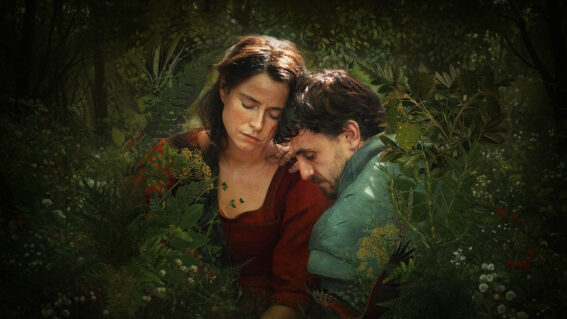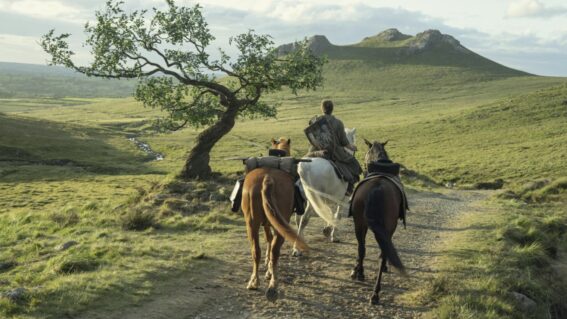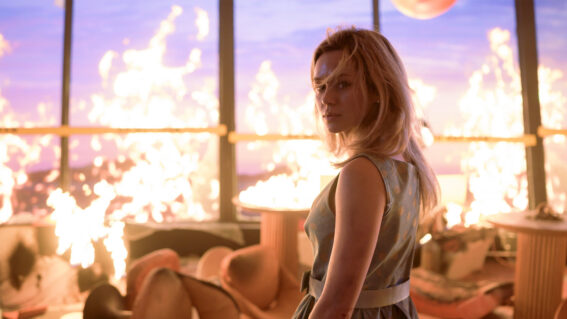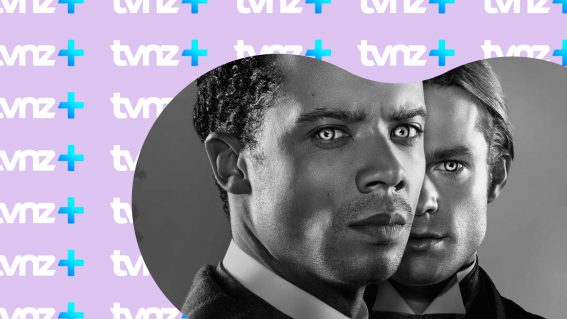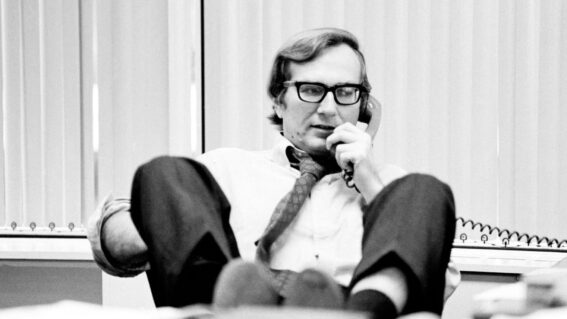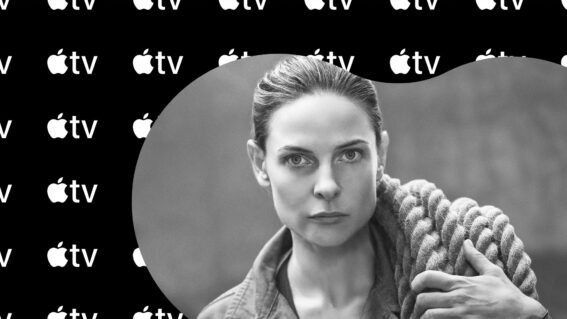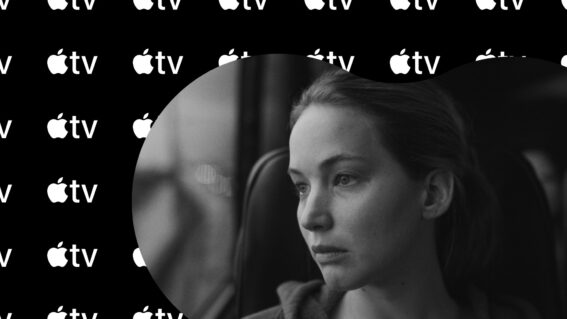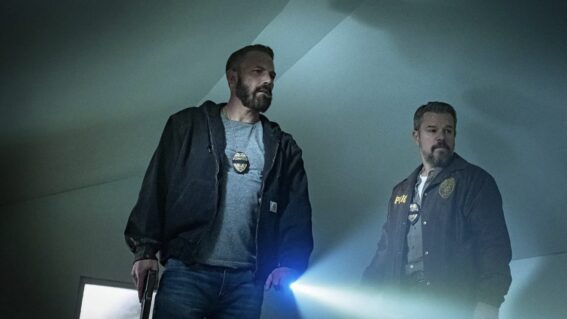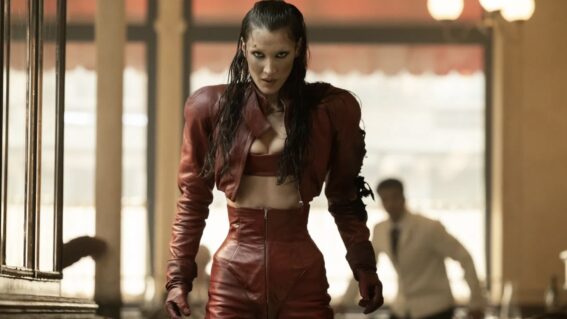NZIFF 2020 Q&A: Kiwi Shorts filmmakers
Lockdown narks, dorky dads, big monster crays, triple scoop ice creams & more.
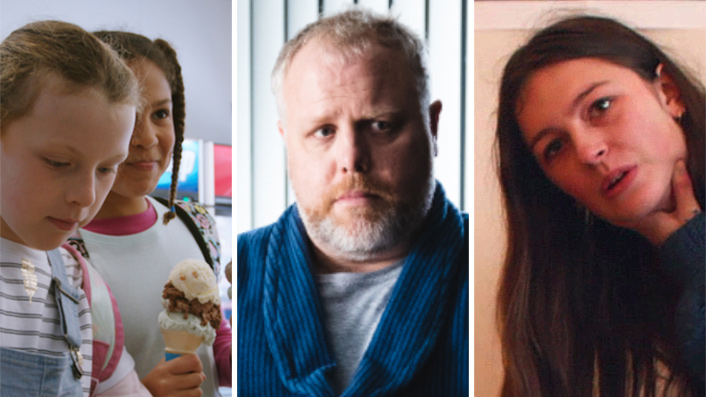
Find out more about the short films in Kiwi Shorts, streaming online as part of Whānau Mārama: New Zealand International Film Festival 2020, running 24 July to 3 August.
We put a few questions to the directors of the six New Zealand films making up Kiwi Shorts. As the festival programme details, they epitomise the Kiwi lifestyle of 2020: “Featuring lockdown narks and dorky dads; big monster crays and triple scoop ice creams; annoying brats and courageous stunts”.
See also:
* Mini-reviews of Whānau Mārama: New Zealand International Film Festival 2020
* All our Q&As with this year’s filmmakers
* Steve Newall’s early picks from the programme
* Liam Maguren’s early picks from the programme
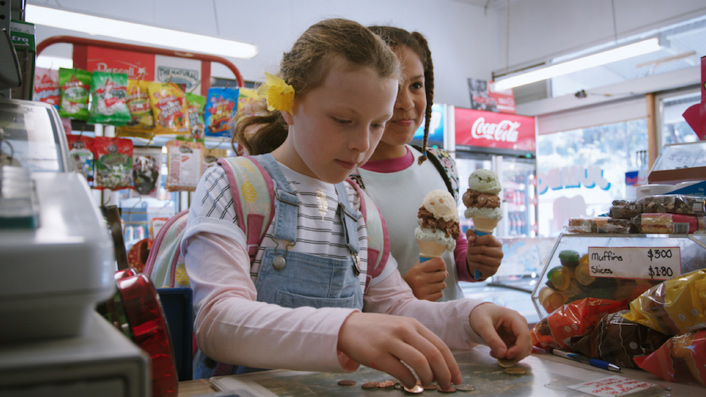
Ruby Abbott Harris, director of Triple Scoop
Describe your film in EXACTLY eight words
Funny, youthful, cheeky, light-hearted, smart, charming, cute and simple.
What drove you to tell this story?
I came up with the idea to make Triple Scoop while understanding the politics of film making and that I only felt comfortable to tell stories that I had experienced. This was the most suitable story that people laughed at and could relate to. I also wrote it for my niece to play the main character and we had to film it quickly because she was growing out of the character quicker than I was writing the script.
What reaction are you hoping to get from audiences?
I want people to laugh and hopefully remember something similar from their own childhood.
Can you share your favourite memory during your time making this film?
My favourite memory was dancing, so much dancing. Between takes, at lunchtime and before filming. Everyone on set was dancing to keep warm, keep the mood high and help the actors feel more comfortable.
What was the last great film you saw?
Acasă, My Home by Radu Ciorniciuc at Doc Edge Online.
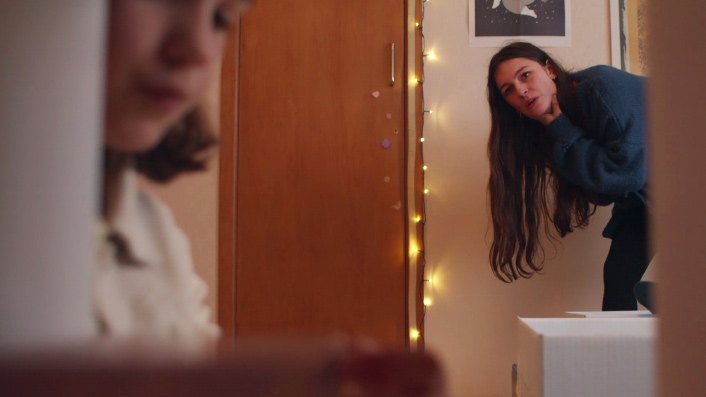
Duncan Dykes, director/screenplay of Childhood Room
Describe your film in EXACTLY eight words
Woman confronts her past to embrace her future.
What drove you to tell this story?
The film is about a young woman at a crossroads in her life; afraid of losing herself as she transitions from the safety of childhood to the uncertainty of adulthood, and unable to grow as a result.
While the story isn’t autobiographical, it is built out of where I am in my life right now—leaving university, entering adulthood, and deciding which parts of myself to leave in the past and which to keep—and creating it at this transitional point in my life felt especially poignant. The film is my love letter to ‘change’; the difficulty of it, but also the value and necessity.
What reaction are you hoping to get from audiences?
In a basic sense, I hope they enjoy it—that they find it funny, and engaging, and memorable. But more than anything else, I hope the film connects to people; that they find in it something that feels truthful and personally meaningful to them, as it does to me.
Can you share your favourite memory during your time making this film?
It’s difficult to pick just one, but some of my fondest memories came from the casting process. Throughout casting, we did our best to make the auditions interesting—so to capture the energy of some of the scenes, we would run scenes where the actors would dart around a room throwing paper balls at each other as they did the lines—which loosened everyone up and made for a super memorable, fun experience.
We had some incredibly talented, impressive actors come in, but with each of the three actors that were cast, their auditions felt like these seismic moments where the film clicked into place. On the day our lead actress Jules auditioned, we had had a number of candidates drop out of auditioning or become unavailable, and we were starting to run short on time to find the right actress for the lead role. We end up with a day that was supposed to see around ten auditions go down to only two people coming in. On top of that, our colleague that usually read against the candidates was unavailable, leaving one of my close friends to step in at the last minute to read as a nine-year-old girl for these auditions (after being awake for about two days straight). It seemed like nothing was going right.
Then, on that day, the second actress to come in was Jules. As soon as she auditioned, our stress about finding the right actress for the lead role disappeared—she immediately captured the voice of the character, delivering the lines exactly as I had heard them in my head. In the course of one audition, we had gone from anxious and uncertain to more confident than ever that the film would turn out okay.
What was the last great film you saw?
Although I’d seen it many times before, I recently rewatched The Princess Bride with a group of my friends—and honestly with the world as it is right now, that movie borders on medicinal. It’s so simple and pleasant, it’s perfect to watch to counter the toxicity and anxiety encircling the world. If more movies were actually just The Princess Bride, the world would be a better place, although I suppose if that were the case then it wouldn’t be as special.
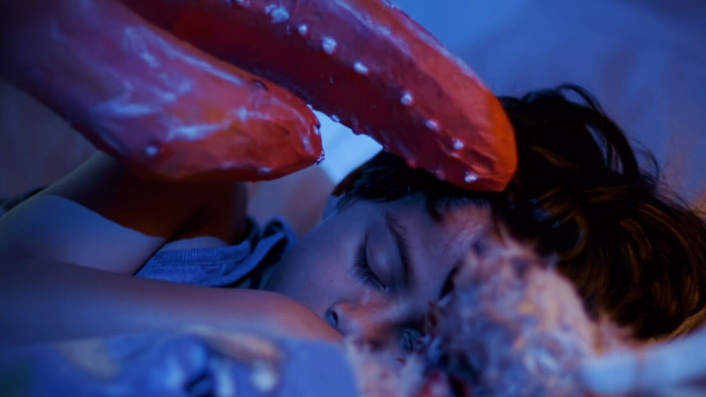
Erin Murphy, director of Missy Fishy
Describe your film in EXACTLY eight words
Suzy Cato TV show meets Crayfish Metamorphosis. Wacky!
What drove you to tell this story?
I wanted to explore my interest in Children’s folktales like that of the Selkie. Combining this with my almost surreal memories of NZ children’s TV shows from when I grew up.
What reaction are you hoping to get from audiences?
Any reaction would be good! Ideally, I hope when someone watches Missy Fishy they feel like they did when they saw films as a kid. With a sense of heightened emotion, a hint of confusion, but ultimately playful fun.
Can you share your favourite memory during your time making this film?
It’s all a bit of a blur. And honestly, it was all a favourite memory. But when I felt the most joy was shooting the moments of bliss that Miss Fish would experience. We would set up the shot with only Petra (Wood) in the frame, blast Mort Garson’s Plantasia really loud, and everyone would have a writhing silly boogie to the music.
What was the last great film you saw?
I watched this amazingly sweet and weird film with Jemaine Clement and Aubrey Plaza called An Evening with Beverly Luff Linn. Now I must watch every piece of Jim Hosking content ever made.
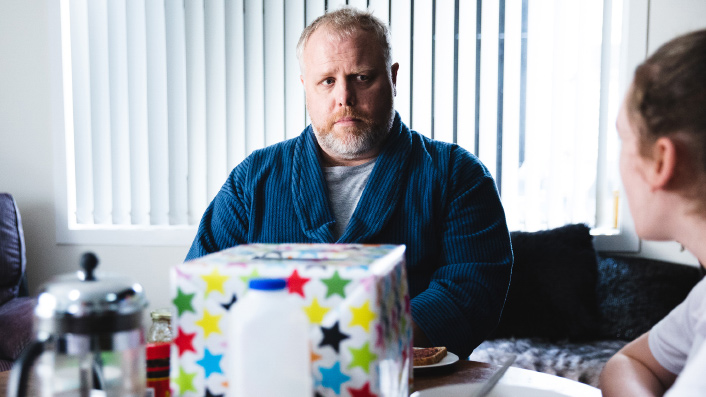
Finnius Teppett, director of Democracy
Describe your film in EXACTLY eight words
Dad voted out. Who will new dad be?
What drove you to tell this story?
This story came out of my year moving back home to do some post-graduate study. Returning to that family dynamic, as an adult, all of a sudden I could see all of these politics underlying everything we did. There were alliances, bargains, bribes, power grabs, leaps of faith, pleas, truces, mercies, all this political action driving the family unit. So it was obvious what the next logical step would be—an outright election. And I ran with that!
What reaction are you hoping to get from audiences?
Sometimes when I tell people about the premise of this film—that it’s about a Dad who gets voted out of his family—they reply “Oh I’ve got some family members I wouldn’t mind having a vote on.” So I hope audiences recognise the family politics the film is about, and either feel for the protagonist, or enjoy watching him get his just desserts. And I won’t be mad if “family election” makes its way into people’s conflict resolution toolbox!
Can you share your favourite memory during your time making this film?
I’ve done live comedy before where jokes are mostly just writing and delivery, so I loved working in film where you can heap layers onto jokes—they just get funnier and funnier each stage they go through. There’s a long take involving a microwave-baked cake in Democracy that I thought was the funniest thing I’d ever seen when we choreographed and shot it, all the parts moved perfectly, it was hilarious. And then after finding the funniest points to enter and exit the shot, and then layering music onto it, and sound design, and even the grading? Even funnier than it was on the day.
What was the last great film you saw?
I finally got around to watching Uncle Boonmee Who Can Recall His Past Lives recently, and absolutely loved it. Portrait of a Lady on Fire is another frame-perfect masterpiece—I missed it at the NZ International Film Festival so was over the moon when it came back!
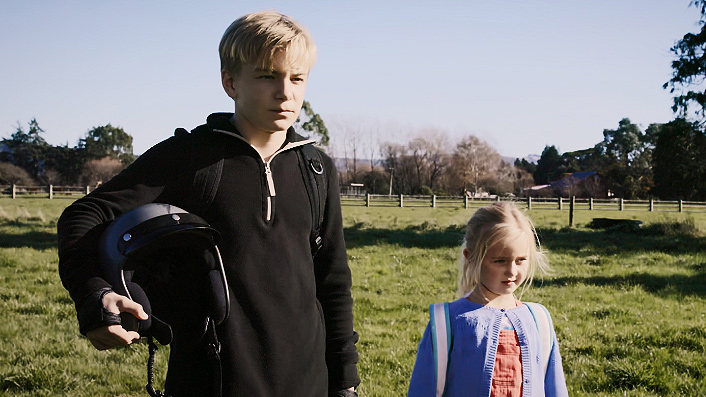
Pavel Kvatch, director of Stuntman
Describe your film in EXACTLY eight words
Two kids and a giant leap between rooftops.
What drove you to tell this story?
Being the youngest of two brothers, I could relate to the desire to partake in your older sibling’s adventure. Not considering the consequences of what you might be doing. I thought a lot of people could relate to that. Also, along with a very evocative moment in the climax, the jeopardy of young kids playing on a rooftop, and with a final cathartic moment in the end, I thought the script had the necessary element to be a nice little short film.
What reaction are you hoping to get from audiences?
I hope audiences are drawn in enough to be held in suspense and shock during the film’s climactic moment, and to experience some sense of catharsis in the end, knowing that everything turned out ok.
Can you share your favourite memory during your time making this film?
It’s nothing too special; I think just starting the first day of filming with a beautiful sunny morning. Seeing the bustle of the crew gearing up for the first time. Knowing that all of the effort is finally coming together, and having that beautiful light to start it all off was a great moment.
What was the last great film you saw?
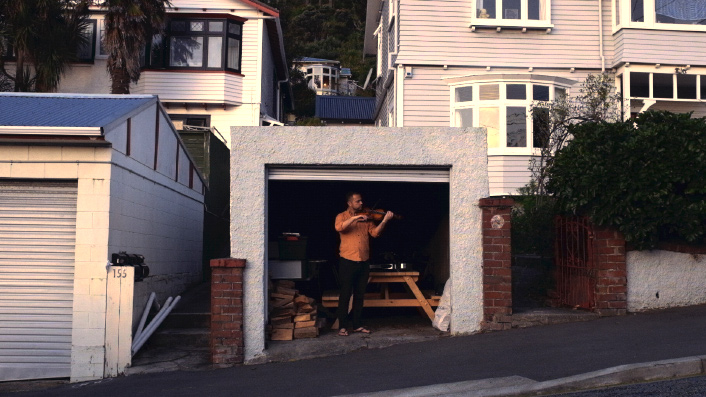
Catherine Bisley, director of Garage Stories
Describe your film in EXACTLY eight words
Glimpses of people’s lives during COVID-19 L4 lockdown.
What drove you to tell this story?
Seeing an explosion of activity in people’s garages when I was out walking under lockdown. The specific garage scene that sparked the idea for the film was this one guy who seemed to be constantly playing darts (he must have thought I was constantly walking my dog). I wanted to capture the feeling of all this activity in these garages which functioned almost as satellite spaces to people’s homes. I hoped to make sense of some of the rituals around this new way of being, the things people were doing out of boredom or anxiety or necessity to make it through this time.
What reaction are you hoping to get from audiences?
While everyone had vastly different experiences of lockdown, I think it is true that there was no-one who was unaffected by it. I hope the film captures something people can relate to. I hope they are moved and entertained.
Can you share your favourite memory during your time making this film?
There’s this puppet show scene in the film. Because I wanted specific finger puppets (my own), I shot the insert of the puppets at my place (the puppeteers themselves were in a different bubble). For some reason, my puppets sound like they’re suffering from laryngitis (I did the dialogue as a guide track only). So anyway, I’m lying on the concrete of my garage floor croaking away but the wind keeps blowing my iPhone, which is filming from a stack of books (a.k.a. my tripod), over.
After a couple of abortive attempts, I finally secure the phone (more, heavier books) and have fine-tuned the light to match the scene that the shot was going to be inserted into. I started the scene. Sometimes you can just feel that something is working: I was definitely getting that feeling. But then my dog Nora (who also starred in my 2017 film Untitled Groping Revenge Fairytale), pads up, hungry for further fame, inserts her nose into frame, and has a good sniff. Her muzzle dwarfs the mule and dog who were in the midst of a working-from-home argument. Needless to say, this take was not used. But Nora does get her moment elsewhere in the film.
Also, when I was sent the first lot of footage by Leith Duncan, who plays the “Self Havening Man” I had this sense of elation. His footage perfectly captured the mood I was after and I realised the film was possible and it wasn’t mad to be trying to make it.
What was the last great film you saw?
I finally watched Sweet Country by Warwick Thornton. It really is all it’s cracked up to be.





